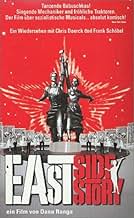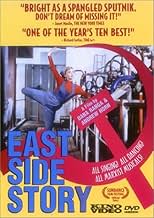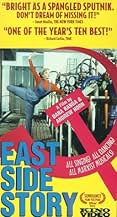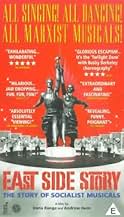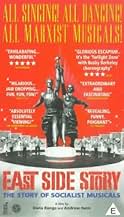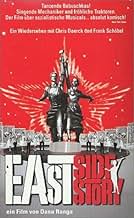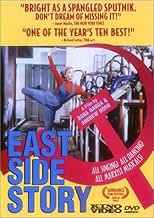Ajouter une intrigue dans votre langueA look at Communist musicals that strove to be ideologically correct - and entertaining, besides.A look at Communist musicals that strove to be ideologically correct - and entertaining, besides.A look at Communist musicals that strove to be ideologically correct - and entertaining, besides.
- Récompenses
- 1 nomination au total
Margarita Andrushkovich
- Self
- (as Margarita Andruschkovitsch)
Nikolai Bulganin
- Self (watches military parade)
- (images d'archives)
- (non crédité)
Nikita Khrushchev
- Self
- (images d'archives)
- (non crédité)
Marina Ladynina
- Various roles
- (images d'archives)
- (non crédité)
Vladimir Lenin
- Self
- (images d'archives)
- (non crédité)
Anastas Mikoyan
- Self (watches military parade)
- (images d'archives)
- (non crédité)
Vyacheslav Molotov
- Self
- (images d'archives)
- (non crédité)
Histoire
Le saviez-vous
- Crédits fousThe end credits dedicate the film "to Karl Marx, without whom none of this would have been necessary."
- ConnexionsFeatured in The Movie Show: Épisode datant du 15 juin 1997 (1997)
Commentaire à la une
I wonder if I could take sitting through a whole musical comedy from Russia or East Germany or other countries that for decades put out almost always propagandistic film, anti-fascist films, anti-war films (as this documentary points out) that just reflected the dark, grueling times under Stalin and life behind the Iron curtain. It's fascinating then to see the other side of the coin, the sorts of clowns and rebels with music at their side to try and please the masses more often than not stuck in the Socialist walk of life. One film actually seemed rather impressive, called Jolly Fellows by the pioneer of the very small group of musical filmmakers, Grigori Aleksandrov. From the clip(s) I saw of that film, I'd wager that it was one of the only works to actually step out of itself and go into just wild, manic, make-you-laugh kind of mode. But as this film shows, if you were a filmmaker looking to entertain, it better be with a 'message'.
Through interviews, some occasional quasi-dramatizations (of Russia/Germany/etc's sort of motion picture association) at the censorship table, and clips, one gets the full picture of what it was like- both behind the scenes and on the screen- to just make sheer entertainment for the masses. Some of the films (well, most of them, as apparently only 14 screened over 40 years in the countries mentioned) made a good chunk of change, but for what purpose really? One also gets drawn into the culture of it all, how it differs greatly from the American way of 'if it works, make em while they're hot' attitude. But at the same time, perhaps out of this repression, some interesting, funny, and (from what I saw) up-beat films were made. They might've been fairly typical of what was asked to be shown to the masses, under Stalin's fond but demanding terms, like life with tractors. It gets to be even juicier a story though as we get shown what it was like in the 60's, the last wave of musical comedies, as rock and roll and pop tunes finally hit their airwaves.
In short, some good stuff...but only if interested, really. I was shown the film in a class on documentary films, and half the class fell asleep. So be warned on the one hand, though on the other if looking for it, it can make for a really rewarding trip into European film history.
Through interviews, some occasional quasi-dramatizations (of Russia/Germany/etc's sort of motion picture association) at the censorship table, and clips, one gets the full picture of what it was like- both behind the scenes and on the screen- to just make sheer entertainment for the masses. Some of the films (well, most of them, as apparently only 14 screened over 40 years in the countries mentioned) made a good chunk of change, but for what purpose really? One also gets drawn into the culture of it all, how it differs greatly from the American way of 'if it works, make em while they're hot' attitude. But at the same time, perhaps out of this repression, some interesting, funny, and (from what I saw) up-beat films were made. They might've been fairly typical of what was asked to be shown to the masses, under Stalin's fond but demanding terms, like life with tractors. It gets to be even juicier a story though as we get shown what it was like in the 60's, the last wave of musical comedies, as rock and roll and pop tunes finally hit their airwaves.
In short, some good stuff...but only if interested, really. I was shown the film in a class on documentary films, and half the class fell asleep. So be warned on the one hand, though on the other if looking for it, it can make for a really rewarding trip into European film history.
- Quinoa1984
- 30 janv. 2006
- Permalien
Meilleurs choix
Connectez-vous pour évaluer et suivre la liste de favoris afin de recevoir des recommandations personnalisées
Détails
- Date de sortie
- Pays d’origine
- Langues
- Aussi connu sous le nom de
- Истсайдская история
- Lieux de tournage
- Sociétés de production
- Voir plus de crédits d'entreprise sur IMDbPro
- Durée1 heure 15 minutes
- Couleur
Contribuer à cette page
Suggérer une modification ou ajouter du contenu manquant

Lacune principale
By what name was East Side Story (1997) officially released in India in English?
Répondre
